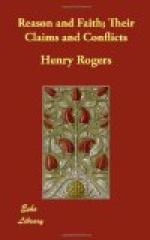____
* The main objection, both with the old and the new forms of infidelity, is, that against the miracles; the main argument with both, those which attempt to show their antecedent impossibility; and criticism directed against the credulity of the records which contain them. The principal difference is, that modern infidelity shrinks from the coarse imputation of fraud and imposture on the founders of Christianity; and prefers the theory of illusion or myth to that of deliberate fraud. But with this exception, which touches only the personal character of the founders of Christianity, the case remains the same. The same postulates and the same arguments are made to yield substantially the same conclusion. For, all that is supernatural in Christianity and all credibility in its records, vanish equally on either assumption. Nor is even the modern mode of interpreting many of the miracles (as illusions or legends) unknown to the older infidelity; only it more consistently felt that neither the one theory nor the other, could be trusted to alone. Velis et remis was its motto. + Such is Quinet’s brief statement of Strauss’s mystico-mythical Christiantity, founded on the Hegelian philosophy. For a fuller, we dare not say a more intelligible, account of it in Strauss’s own words, and the metaphysical mysteries on which it depends, the reader may consult Dr. Beard’s translation;—pp. 44, 45. of his Essay entitled ’Strauss, Hegel, and their Opinions. ____
Whether it be the Rationalism of Paulus, or the Rationalism of Strauss—whether that which declares all that is supernatural in Christianity (forming the bulk of its history) to be illusion, or that which declares it myth,—the conclusions can be made out only by a system of interpretation which can be compared to nothing but the wildest dreams and allegorical systems of some of the early Fathers#; while the results themselves are either those elementary principles of ethics for which there was no need to invoke a revelation at all, or some mystico-metaphysical philosophy, expressed in language as unintelligible as the veriest gibberish of the Alexandrian Platonists. In fact, by such exegesis and by such philosophy, any thing may be made out of any thing; and the most fantastical data be compelled to yield equally fantastical conclusions. ____
# Of the mode of accounting for the supernatural occurrences in the Scriptures by the illusion produced by mistaken natural phenomena, (perhaps the most stupidly jejune of all the theories ever projected by man), Quinet eloquently says, ’The pen which wrote the Provincial Letters would be necessary to lay bare the strange consequences of this theology. According to its conclusion, the tree of good and evil was nothing but a venomous plant, probably a manchineal tree, under which our first parents fell asleep. The shining face of Moses on the heights of Mount Sinai was the natural result of electricity; the vision of Zachariah




